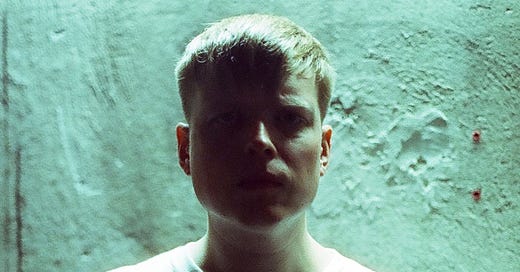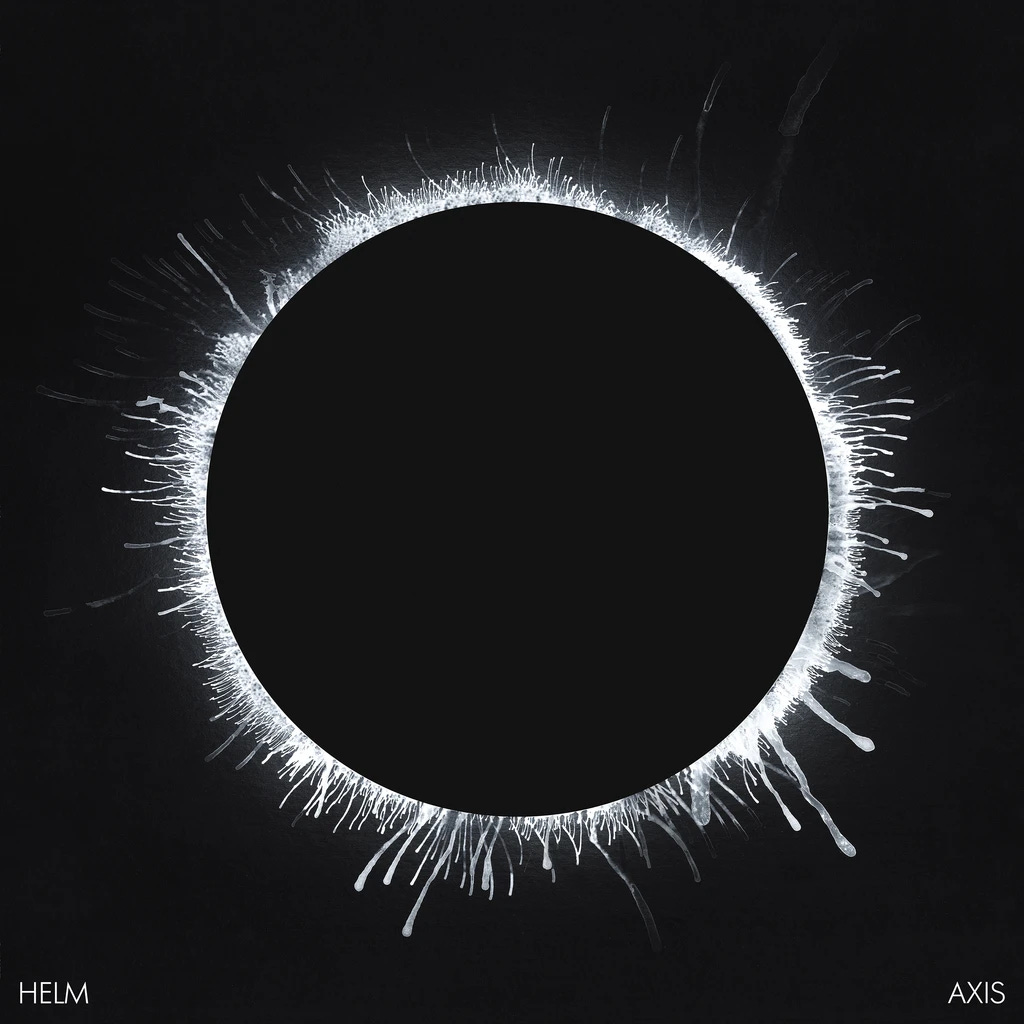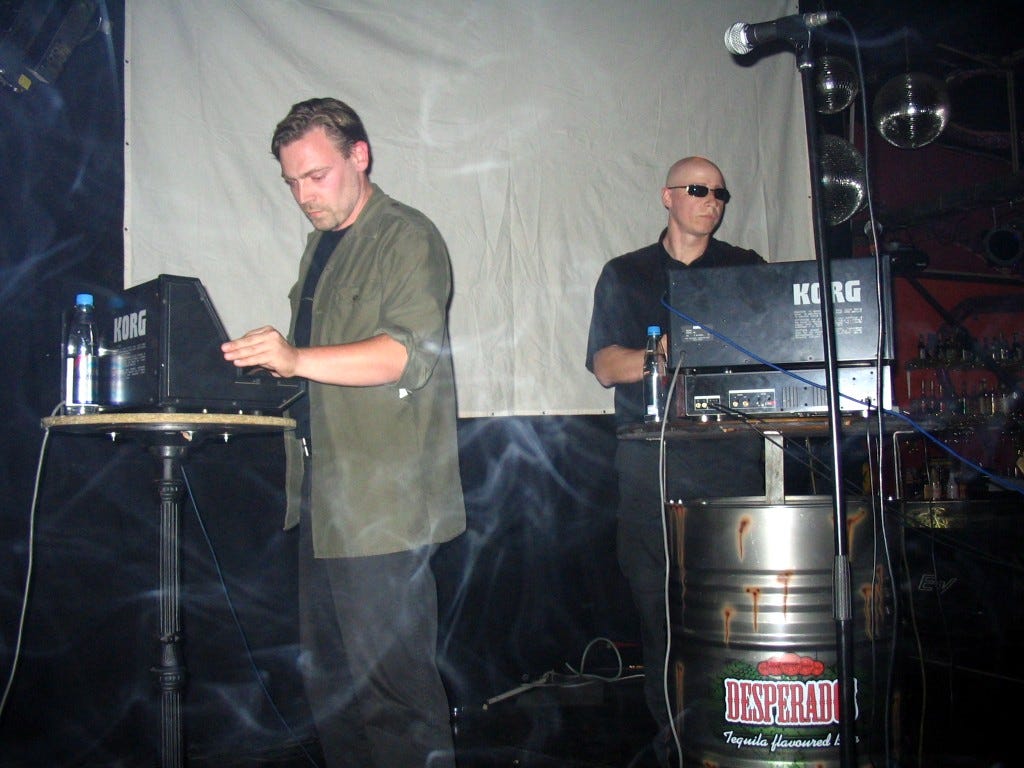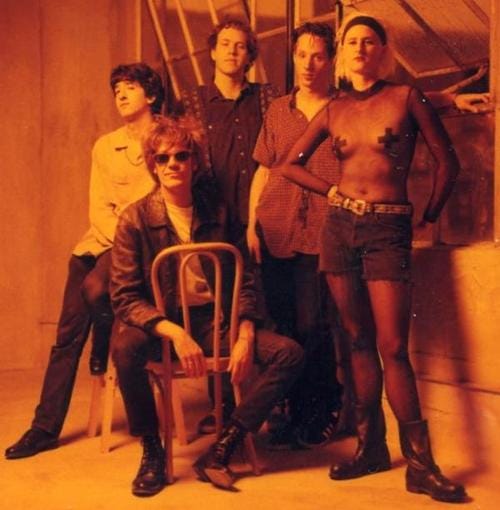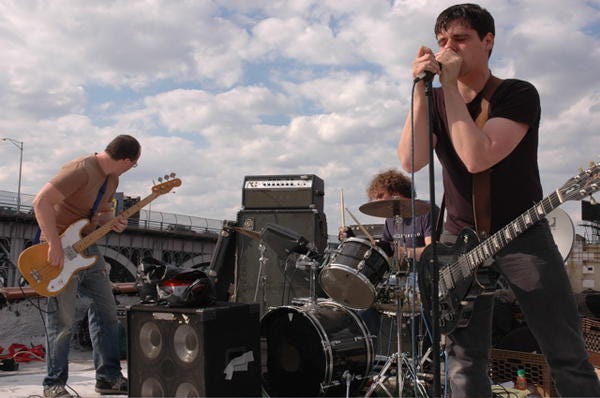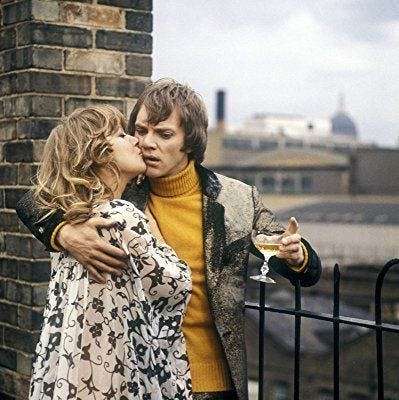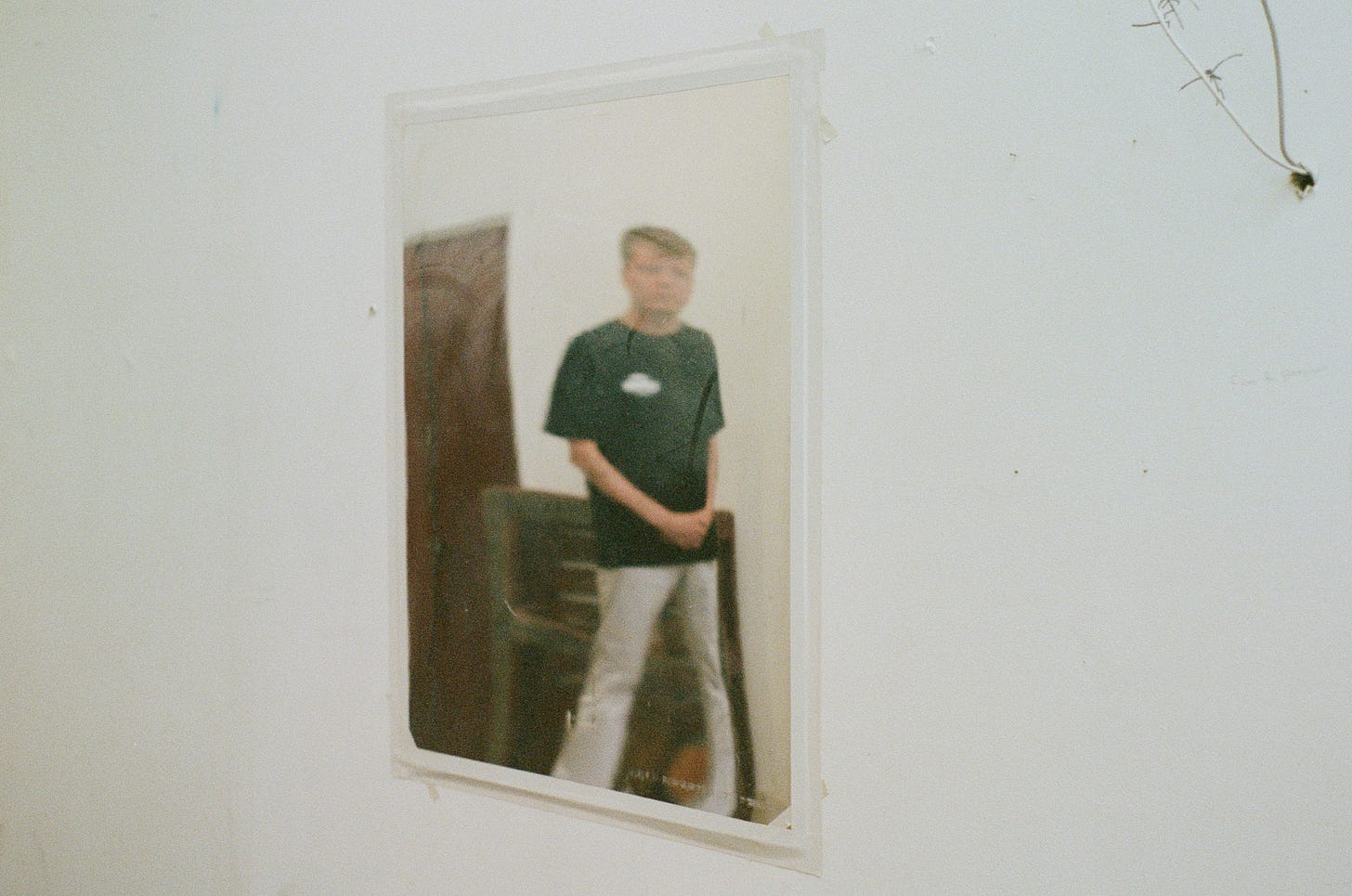Safety Propagandist #9: Helm
Electronic music producer and cerebral British chap Helm, AKA Luke Younger, discusses his upcoming record 'Axis'
Helm, also knows as the fine young man of British origin Luke Younger, is about to release his new album Axis, his first for the Los Angeles-based Dais Records. Helm has been one of my favorite contemporary soundmakers since I first came across 2014’s Olympic Mess, a hallucinatory and droning fragment of dub, industrial, and balearic disco — that year it became a constant soundtrack to late night ketamine usage and comedowns as I struggled to get clean — and realized that I had already been acquainted with Luke and his music from his years spent in the duo Birds of Delay alongside fellow Brit Steven Warwick (now plays as Heatsick). I’ve been a Helm loyalist ever since and have devoured the entirety of his discography. 2011’s Cryptography is a delirium of bizarre piano lines, glacial drones, and mountainous walls of white hot noise. 2019’s Chemical Flowers, while quieter than other outings, is every bit if not more so surreal and strange with its emphasis on sound collaging techniques, beauty splicing into horror and menace. And so on.
My first impressions of Axis are that, in contradistinction to the last couple of Helm releases, it’s very, very heavy, and evocative of the subterranean noise underground that Helm emerged forth from the viscous depths of: ““I tuned back in to working with noise techniques again: more primitive equipment, cheap FX, contact mics, noise boxes,” he told his record label. But the noise here is one of a deep, compositionally rigorous, and methodical kind. It’s refreshing to hear electronic sound of this intensity come in the form on an actual album and not the countless throwaway CDRs and digital releases that contemporary noise artists shit into existence on a weekly basis. This is the noise of Kevin Drumm’s Sheer Hellish Miasma, Oscillating Innards’ Nadir Emergency, or C.C.C.C.’s Loud Sounds Dopa: textured, massive, beautiful, psychedelic, and terrifying in equal measure. But featuring key guest contributions by Lucy Railton (cello), Mark Morgan of Sightings (guitar), Alex Tucker (vocals), and the late, legendary John Hannon (violin) further, the album stretches out so much farther than the sum of its influences, and is a sure contender for my favorite record of 2021. Alas, let’s let Luke do more of the talking; this counter-agent shall shut the fuck up and hand the mic over to a new recruit into the Counter-Agency of the Avant-Garde: HELM.
Adam Lehrer: This record has a cinematic menace to it, the title track "Axis", for instance, has such a collision of sounds that it becomes genuinely disturbing. Am I correct that this record feels, I don't know, darker than the last couple?
Helm: I would say that’s a fair assessment in part. Much of the material on the album initially came from a commission I’d received to soundtrack a dance show. When viewing the choreographer’s previous work for reference and talking with him about the kind of material he was wanting for the project, I realized I was going to have to switch to a specific headspace in order to tackle the brief appropriately. His vision was for something intense and immersive with erratic, semi-improvised movement, my interpretation of it being like in the throes of a drug ceremony gone wrong. The performance was shelved as soon as 2020 began. The choreographer was part based in Hong Kong and I think he saw the early stages of Covid coming there and called it appropriately. I had all this material from the sessions so decided to keep working on the pieces and make an album out of it. I still got paid for my work which was great.
Chemical Flowers (my previous LP) feels like a dark record to me but in a more cryptic way, perhaps. I see that record as having a desolate quality - like visiting an uninhabitable land after a terrible accident – whereas some parts of this record feel like war.
AL: You’ve said you returned to the techniques of noise for this album, what got you interested in going back to these kinds of forms and methods?
H: Originally the impulse came through my live sets. My recordings have always been fairly nuanced but if you put a crowd in front of me then I can’t seem to shake the urge to blast them with something loud, even after all these years. Around the time of touring Olympic Mess, my gigs were getting increasingly noisy and physical and as such I wanted to find a way to incorporate this energy into my recordings. It didn’t feel appropriate for Chemical Flowers but when I started writing for the choreographer his ideas helped to push me towards those methods. I was creating work with physical movement in mind, sounds that could literally shake the body.
I bought some new equipment for the purpose — some cheap pedals and various other effects/noise boxes — and spent a lot of time just fucking around with a basic set-up in the studio, not trying to overthink the process too much. There was a lot of spontaneous energy. As someone who can get easily sucked into tedious processing techniques like endless EQing of single sounds or precise placement of kick drums, it felt exciting to be working in this way again. I ended up with a lot of mindless and freeform takes, the best of which were edited down and used across the whole album.
I guess in the last few years I have also re-connected with noise music as a listener, which definitely had some influence on my general practice as well. Going through old CDs of the RRR Pure catalogue, Ground Fault Recordings, Alchemy Records… all this stuff still sounds amazing to me.
AL: Building on the point about the equipment, indeed in contrast to the last couple albums, there are aspects of this album that descend into something more resembling noise music. Certainly the last two minutes of "Axis," when the song descends into maelstrom evokes death industrial, and the end of "Tower" has a synth beauty undercut by a squelching noise. What were you listening to, or even just feeling, that made you want to get this heavy again?
H: I guess I’d have to begin by returning to parts of my previous answer. The feeling had come from playing live and had been incubating for a while, waiting for the right moment. Listening wise, many classics from the labels mentioned previously too.
You’re very perceptive to pick up on the nod to “death industrial”. The core element of the track “Axis”, the monophonic dead tone, was intended to evoke that kind of atmosphere so I take that as a huge compliment! I’ve always been a fan of the label Tesco Organisation and I had been listening to some of the core groups from its roster like Ke-Hil the album Noehaem by Anenzephalia was something I was listening to a lot and it’s probably fair to say its influence can be heard.
I’d also been quite deep in the early Tangerine Dream discography, from Alpha Centauri up to the Virgin album, timeless masterpieces. I listened to a lot of Aube too, Cardiac Strain and Infinitely Orbit in particular. I also became obsessed with Cabaret Voltaire again and I got inspired to buy my first drum machine as a result of listening to The Voice of America one day during lockdown. This was used to make the more rhythmic tracks on the album. Even as I write this I am listening to the Mute Records Listen Up With Cabaret Voltaire compilation…RIP RHK!
I should probably mention the band Medicine also as I got into them in a big way, particularly their album The Buried Life. It has this perfect mash-up of being super noisy and harsh but with a dreamy pop-like sensibility. I’m a big fan of groups like them (and the Cabs too) that exist at this weird intersection between noise/industrial and other genres like “shoegaze”/post-punk or whatever. It often feels genuinely experimental to me and I would love to take this influence further at some point in the future.
AL: Do you feel that the desire to go back to your origins had anything to do with the erosion of culture we've all been experiencing and to tap into some freedom that we've all lost sight of as we've grown into middle age, watching our friends become unrecognizable ghouls with their heinous instagram posts and tweets?
H: I’d say you’ve hit on something significant there. As an artist I believe it’s important to focus on your own work first and foremost, but you need to create the conditions for yourself in order for this to be possible. You need a group of close allies whose opinions you can trust and not engage with the nonsense that will inevitably drag you down and stop you from being productive. Even though I’m associated somewhat with contemporary electronic music, the trends and online behavior within that scene leave a bad taste in my mouth. It can be pretty sad to witness people ripping each other apart publicly for their own clout and virtue, whilst also being completely subservient to the most soulless aspects of capital in order to function as artists or DJs. I’ve always tried to follow my own path and ignore it all. Maybe with a bit of pandemic-induced distance from the whole thing I’ll have managed to disassociate myself from that noise even further.
Moaning aside and despite the bullshit, I’ve made a lot of good friends through doing this and count myself lucky for the good times and opportunities I’ve had. As far as social media goes, I got a website built so I could rely less on these platforms for keeping people updated with my activities. You can follow me for occasional content on Instagram but I stay away from Twitter now, other than to check in on ICE-T’s feed every now and then.
AL: You have some great collaborators on this record. Our mutual friend Mark Morgan provides guitar psychosis. Alexander Tucker does some vocals. There are many more. How did you go about selecting the collaborators?
H: Sometimes I’ll hit a moment with a track and realize it needs something extra from the outside in order to bring it to the point I’m trying to achieve. With this album I knew I wanted to include some strings to bolster certain parts, so hit up Lucy Railton and my long-time friend and engineer John Hannon who both kindly recorded some cello and violin for me. Mark is another long-time friend so was an obvious choice when it came to adding some twisted guitar parts. Alex was somewhat of a “spiritual advisor” when the record was in the final stages of completion. I was playing him tentative mixes and asking for his opinion on whether anything could be added. He suggested adding voice to the track ‘Crash’ so I asked if he would step up and flex his vocal chords…
A horrible aside from all of this though is that John Hannon passed away unexpectedly as soon as the record was finished. He has been my most consistent collaborator over the years. He engineered the majority of my records going back to day one and has been an integral figure with regards to how my music has managed to evolve and operate. In recent years he offered his studio to me as a space to work in and about half of Axis was made there before the pandemic hit. A lot of my work wouldn’t have been the same without John and the record is dedicated to his memory.
AL: After having recorded the last few records for PAN and then the new one for Dais, was that any aesthetic choice involved in that or is it just a whose gonna release it sort of thing? Stupid question but I'm mildly retarded right now.
H: The decision wasn’t too premeditated. After 10 years since my first album and five great records with PAN, I felt like it was maybe time to take a different approach and work with another label. Dais seemed like an obvious choice as I’ve known the guys there for a while and had a feeling that perhaps that the door was open with regards to doing a record. They got on board and have been great to work with, I couldn’t be happier.
AL: When Olympic Mess came out you said to FACT that it was the first record you made informed less by ideas than it was by social life, but social life had largely disappeared during the bulk of this recording, so is Axis once again a more ideas-based record?
H: Yes that seems fair. Looking back on it though, I think Olympic Mess was still heavily informed by a lot of musical ideas and there was definitely a particular vibe / atmosphere I was trying to hit with it (and feel I succeeded). I guess a lot of the additional context mentioned in the press for that record was a result of some significant life switch ups, me turning 30 and having somewhat of an existential crisis – which in retrospect is maybe a little cringe but was also an honest reflection of where I was at the time so who cares.
AL: As I mentioned above, I felt a cinematic quality to this record, an atmosphere that reminded me of Zulawski, perhaps, all paranoid and heightened. Is this accurate? What kind of cinema do you like?
I can’t say I’m too familiar with Zulawski other than the film Possession which I remember enjoying. Believe it or not, I’ve never really considered my music in relation to cinema a great deal. I fully appreciate that some people will try to contextualize it in that way as a means of understanding it though, which is fine. If the right director came knocking then I’d certainly consider the opportunity, but it’s never been a dream of mine to land that lucrative soundtrack deal that many other artists seem to crave.
When it comes to cinema I am all over the place, but tend to find films that use music sparingly more appealing to my tastes. Watching films at home is difficult for me a lot of the time as I’m easily distracted and watched only a handful over the course of the pandemic. My favorite was the remake of Suspiria which I thought was great.
Some directors I like are Michael Hanneke, Mike Leigh, Gaspar Noe, Alan Clarke, John Cassavetes, Kubrick, Nicolas Roeg, Lindsay Anderson…that probably sums my tastes up pretty well. My favorite film of all time is Lindsay Anderson’s O Lucky Man, which actually has a really musical soundtrack by Alan Price from the Animals and works really well given the (at times) surrealist nature of the film. I’d say British television and radio from the ’80’s and ’90’s has had an equally important influence in shaping my mind over the years and I like to throw references to this in my work sometimes. My monthly radio show is named after a late-night Channel 4 talk show from the late 80’s called After Dark for example. It was a really weird program where a group of ten or so guests would be selected to have an open-ended discussion about a “controversial” topic. The guests were a weird mix of people that had some relation to the topic of discussion. They included everything and everyone from politicians, actors, sex-workers, activists, journalists, pornographers, Billy Bragg, Tony Blackburn, David Irving, etc. The final episode was one of the most bizarre cultural moments in British television history for me. It was a discussion on the Yorkshire Ripper and had Stefan Jaworzyn from Shock Records/Skullflower, Peter Sutcliffe’s dad and Michael Winner, the film director. Goes without saying that something like this would never be made again in a million years.
AL: And the annoying music blog question but let's do it for the fans, what are five records you were into while making Axis?
H:
Anenzephalia – Noehaem
Tangerine Dream – Zeit
Cabaret Voltaire – The Voice Of America
Aube – Cardiac Strain
Medicine – The Buried Life
Thank you Adam and thanks to anyone who supports my work.
ILLUSTRATIONS
1. Helm by Isabelle O’Toole.
2. Helm Axis
3. Anenezephalia
4. Medicine
5. Mark Morgan with his band Sightings
6. Lindsay Anderson’s O Lucky Man
7. Helm

